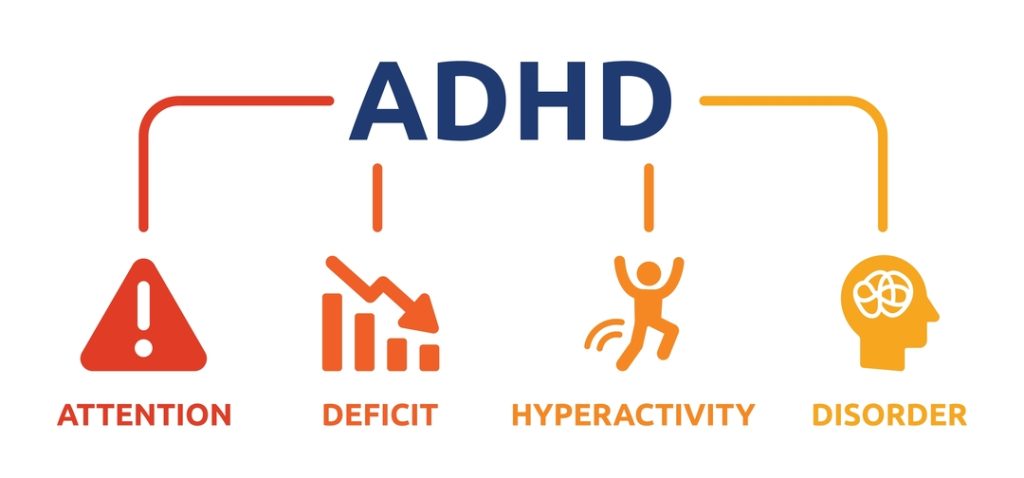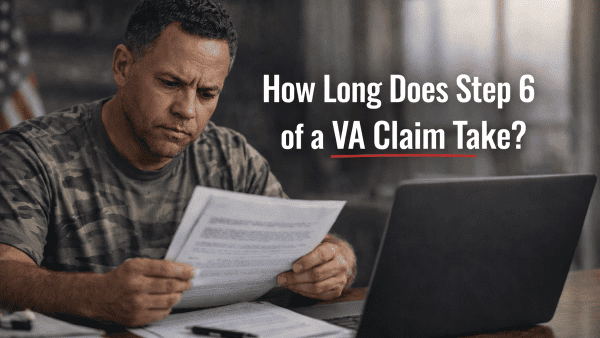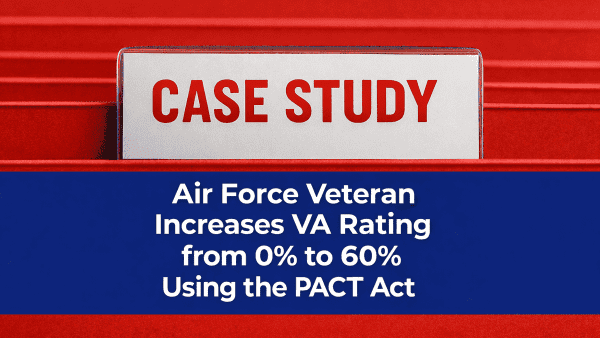Looking for Expert-Level VA Claim Answers?📱Call Us Now! 737-295-2226
As of 2020, more than 366 million adults worldwide suffer from Attention Deficit/Hyperactivity Disorder (ADHD).
If you have a diagnosis, then you’re probably wondering, “Can I get VA disability for ADHD?”
This post explains how your ADHD symptoms could qualify you for ADHD VA disability benefits.
Read on!
Table of Contents

VA Disability for ADHD
Can I Get a VA Rating for ADHD?
Yes, you can get an ADHD VA rating, but getting your ADHD service-connected is difficult. (We’ll explain why later). But first, you need to know what “service connection” means.
There are five types of service connections:
- Direct Service Connection – Your service is directly responsible for your condition.
- Presumed Service Connection – When the VA automatically assumes your service caused your condition.
- Pre-Existing Injury Aggravated by Military Service – Your service made your condition worse.
- Secondary Service Connection – When a service-connected disability causes another condition.
- VA Medical Malpractice – When the VA is responsible for your condition.
A “service-connected” disability is a condition that the VA has decided falls under one of these 5 categories.
To make this determination, the VA needs to see evidence that something happened during and because of your military service that caused your condition or made it worse. If it didn’t happen during your service or isn’t related to your military service, then your condition is likely not service-connected.
For VA purposes, your service could have caused or aggravated your condition in 3 ways:
- An event occurred during your service that caused/aggravated your condition (This could be exposure to Agent Orange or a traumatic event that leads to PTSD).
- You caught/developed a disease because of your military service (such as Diabetes or Tuberculosis).
- You were injured in the line of duty (this could be a Traumatic Brain Injury caused by exposure to an IED blast).
Having an in-service event, injury, or disease is not enough, however. You also need to provide medical proof showing a high probability of a cause-and-effect relationship between your condition and your in-service event, injury, or disease.
This proof can come in the form of medical records or a written opinion from a qualified medical professional (i.e., a Nexus Letter).
Service Connecting VA Disability for ADHD
So, why is it difficult to service connect ADHD?
For starters, there is no diagnostic code (DC) for ADHD. ADHD is a Neurodevelopmental disorder, and these types of disorders are not considered “diseases” or “injuries” according to Title 38 of the Code of Federal Regulations (CFR).
Since ADHD isn’t recognized by Title 38 (this is the section of the federal code governing Veteran Affairs), it isn’t assigned a DC, making it tricky to get an ADHD VA rating.
Another reason is that Attention Deficit/Hyperactivity Disorder is most commonly diagnosed during childhood. If a disorder was identified in your childhood, then it couldn’t have been caused by your military service.
ADHD is also not a VA presumptive condition. A presumptive is a condition the VA automatically presumes was caused by your service. These conditions are usually found in so many veterans that the VA determines they’re associated with military service in certain regions.
What about a secondary service connection? Are there any disabilities rated by the VA that can cause ADHD? Not really. ADHD is usually caused by genetics and problems during early development.

What if The Military Made My ADHD Symptoms Worse?
You might be asking: What’s the get-around to an ADHD VA rating?
Your best bet is to pursue VA disability for ADHD through aggravated service connection. As we said above, this type of service connection is when your military service makes a pre-existing condition worse.
While it’s nearly impossible for your service to have caused your ADHD, it certainly could have aggravated it, which means you could be eligible for a VA rating for ADHD.
ADHD VA Rating Case Study
This information is based on how ADHD usually affects people. ADHD can develop in adulthood, although it’s rare. If you have strong evidence that your military service really did cause your ADHD, then you should consider filing a claim for a VA rating for ADHD.
In 2016, one veteran gave direct service connection a shot. He applied for VA disability for ADHD under diagnostic code 9435: Unspecified depressive disorder.
He was diagnosed with ADHD, depression, as well as PTSD. He tried to make the case that his depression and PTSD symptoms were caused by his ADHD, which he believed to be service-connected.
While his ADHD VA claim was denied, it was because he lacked enough evidence to prove service connection. It wasn’t because the VA refused to award an ADHD VA disability rating.
VA Disability Compensation
Once you do land that coveted disability rating, you’ll start receiving monthly compensation.
To see what you’re entitled to based on rating percentage and family factors, see HERE.
Does the VA Rate Personality Disorders?
There is no disability rating for most personality disorders. This is because they’re not considered diseases or injuries for disability purposes. Similar to ADHD, most personality disorders do not have a diagnostic code.
However, if you have a mental disorder that is somehow related to an intellectual disability or a personality disorder, then that mental disorder can still be connected to service.
One example of this is Bipolar Disorder. Even though Bipolar Disorder has major effects on your personality, it is not technically a personality disorder and can be rated by the VA.
VA Disability for Mental Health Conditions that Accompany ADHD
If your service didn’t aggravate your ADHD, then it will be very difficult to get VA disability for ADHD.
However, several conditions typically accompany ADHD that are rated by the VA.
If you also have any of these conditions and believe it was caused by your military service, then you should consider filing a VA rating:
- Post-traumatic Stress Disorder (PTSD)
- Anxiety
- Depression
- Bipolar Disorder
- Eating Disorders
These conditions share several symptoms in common with ADHD, such as:
- Impulsiveness
- Disorganization and problems prioritizing
- Poor time management skills
- Problems focusing on a task
- Trouble multitasking
- Excessive activity or restlessness
- Poor planning
- Low frustration tolerance
- Frequent mood swings
- Problems following through and completing tasks
- Hot temper
- Trouble coping with stress
Getting a rating for one of these accompanying conditions is a legitimate path to VA disability for ADHD symptoms.
The VA awards ratings based on symptoms. The more your symptoms negatively impact your life, the higher your VA rating. You could almost say the VA rates symptoms, not disabilities.
So, even though you wouldn’t technically have a VA rating for ADHD, you’d still be able to get the ADHD treatment you need and deserve. It would almost be as if you did have ADHD VA disability.
Of course, this means you need to actually have a diagnosis for the accompanying condition. You can’t get a VA rating without a medical diagnosis.
VA Disability for PTSD
PTSD is caused by experiencing traumatic events. The Diagnostic and Statistics Manual of Mental Illness (DSM-5) defines “traumatic event” as “exposure to actual or threatened death, serious injury, or sexual violence.” This exposure then leads to many serious symptoms.
The VA rates PTSD under Diagnostic Code (DC) 9411.
Having a few symptoms isn’t enough, however. To get a PTSD VA rating, these symptoms need to negatively affect your life. The keywords are: how does your PTSD negatively affect your “social or occupational functioning.”
Here is how the VA rates PTSD:
- 100%: VA Rating Criteria for PTSD: Total occupational and social impairment. Symptoms include, but are not limited to:
- Gross impairment in thought processes or communication
- Persistent delusions or hallucinations
- Grossly inappropriate behavior
- Persistent danger of hurting self or others
- Intermittent inability to perform activities of daily living (including maintenance of minimal personal hygiene)
- Disorientation to time or place
- Memory loss for names of close relatives, own occupation, or own name
- 70%: Occupational and social impairment, with deficiencies in most areas, such as work, school, family relations, judgment, thinking, or mood. Symptoms of the 70 percent VA rating for PTSD include but are not limited to:
- Suicidal ideation
- Obsessive rituals that interfere with routine activities
- Speech intermittently illogical, obscure, or irrelevant
- Near-continuous panic or depression affecting the ability to function independently, appropriately, and effectively
- Impaired impulse control (such as unprovoked irritability with periods of violence)
- Spatial disorientation
- Neglect of personal appearance and hygiene
- Difficulty in adapting to stressful circumstances (including work or a work-like setting)
- Inability to establish and maintain effective relationships
- 50%: Occupational and social impairment with reduced reliability and productivity. Symptoms of the 50 percent VA rating for PTSD include but are not limited to:
- Flattened affect
- Circumstantial, circumlocutory, or stereotyped speech
- Panic attacks more than once a week
- Difficulty in understanding complex commands
- Impairment of short and long-term memory (e.g., retention of only highly learned material, forgetting to complete tasks)
- Impaired judgment
- Impaired abstract thinking
- Disturbances of motivation and mood
- Difficulty in establishing and maintaining effective work and social relationships
- 30%: Occupational and social impairment with occasional decrease in work efficiency and intermittent periods of inability to perform occupational tasks (although generally functioning satisfactorily, with routine behavior, self-care, and conversation normal). The 30 percent rating for PTSD has symptoms that include but are not limited to:
- Depressed mood
- Anxiety
- Suspiciousness
- Panic attacks (weekly or less often)
- Chronic sleep impairment
- Mild memory loss (such as forgetting names, directions, and recent events)
- 10%: Occupational and social impairment due to mild or transient symptoms that decrease work efficiency and ability to perform occupational tasks only during periods of significant stress or symptoms controlled by continuous medication.
- 0%: There’s a diagnosed mental condition, but the symptoms aren’t severe enough to disrupt work or social life or need constant medication.
VA Disability for Anxiety Disorders
The VA rates anxiety disorders under DC 9400.
This DC defines anxiety as “severe, uncontrollable worry about day-to-day things. This worry is often irrational.”
Anxiety is rated according to the same criteria as PTSD.
VA Disability for Depression
Depression can be rated under:
- DC 9433: Persistent Depressive Disorder
- DC 9434: Major Depressive Disorder (Clinical Depression)
- DC 9435: All other depressive disorders
The above conditions are also rated according to the same criteria as PTSD.
VA Disability for Bipolar Disorder
Bipolar Disorder is rated under DC 9432 and is also rated according to the same criteria as PTSD.
VA Disability for Eating Disorders
The VA only rates two eating disorders:
- DC 9520: Anorexia Nervosa – Excessive weight loss caused by not eating at all or very little.
- DC 9521: Bulimia Nervosa- Excessive weight loss caused by throwing up anything that is eaten.
Eating disorders are not rated according to the same criteria as PTSD. They have their own separate criteria:
- 100%: Losing weight intentionally to less than 80% of the expected minimum weight, having disabling episodes totaling at least six weeks yearly, and needing hospital stays for feeding through tubes more than twice a year.
- 60%: Losing weight intentionally to less than 85% of the expected minimum weight, with disabling episodes lasting six weeks or more each year.
- 30%: Losing weight intentionally to less than 85% of the expected minimum weight, with disabling episodes lasting more than two but less than six weeks each year.
- 10%: Binge eating followed by self-induced vomiting or other methods or resisting weight gain even when under the expected weight limit, diagnosed with an eating disorder and having disabling episodes totaling up to two weeks per year.
- 0%: Binge eating followed by self-induced vomiting or other methods, or not gaining weight even when under the expected limit, diagnosed with an eating disorder but without disabling episodes.
NOTE: An incapacitating episode is a period during which bed rest and treatment by a physician are required.
NEED MORE ASSISTANCE?

Most veterans are underrated for their disabilities and, therefore, not getting their due compensation. At VA Claims Insider, we guide you through the claims process so you may get the rating and compensation you’re owed by law.
Our process takes the guesswork out of filing for VA disability for ADHD and supports you every step of the way in building a fully developed claim (FDC)—so you may increase your rating FAST!
If you’ve filed your VA disability claim and have been denied or have received a low rating—or you’re unsure how to get started—reach out to us! Take advantage of a VA Claims Insider Discovery Call. Learn what you’ve been missing—so you can FINALLY get the disability rating and compensation YOU DESERVE!
About VA Claims Insider
- VA Claims Insider is the #1 most trusted name in VA disability claims.
- 25,000+ disabled veterans served in our membership programs since 2016.
- 30% average VA rating increase for veterans who complete our #1 rated Elite program.
- Employs 215 teammates; comprised of 74 veterans and 16 military spouses.
- 4.7/5.0 average rating out of 4,500+ total reviews; over 4,000 5-star reviews.
Author

Clay Huston
Clay Huston is a former U.S. Army Reserves Blackhawk Pilot and officer. Clay enlisted in the Army in 2013 and was commissioned as a 2LT in 2017 after earning a business degree from the University of Illinois Champaign-Urbana.
Since separating from the military, Clay has pursued a career as a writer. He also runs the nonprofit notfatherless.org, which fundraises for Children’s Homes in Mexico.



